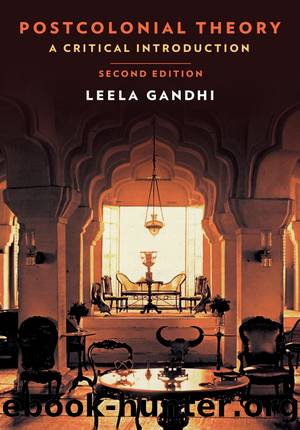Postcolonial Theory by Gandhi Leela;

Author:Gandhi, Leela;
Language: eng
Format: epub
Tags: POL045000, Political Science/Colonialism & Post-Colonialism, LIT025030, Literary Criticism/Subjects & Themes/Politics
Publisher: Lightning Source Inc. (Tier 3)
Published: 2019-01-02T00:00:00+00:00
Mutual Transformations
As I have been arguing, postcolonialism pursues a postnational reading of the colonial encounter by focussing on the global amalgam of cultures and identities consolidated by imperialism. To this end, it deploys a variety of conceptual terms and categories of analysis which examine the mutual contagion and subtle intimacies between coloniser and colonised. In this regard, the terms ‘hybridity’ and ‘diaspora’, in particular, stand out for their analytic versatility and theoretical resilience.
By and large, the language of hybridity seems to derive its theoretical impetus from Fanon’s astute reading of colonial oppression as a catalyst for the accelerated mutation of colonised societies. It is Fanon’s contention in A Dying Colonialism that the unpredictable exigencies of the decolonising project radically unsettle centuries-old cultural patterns in colonised societies. The shifting strategies of anti-colonial struggle, combined with the task of imagining a new and liberated postcolonial future, generate a crisis within the social fabric. As old habits give way to the unpredictable improvisations of revolutionary fervour, the colonised world submits to the momentum of political renovation and cultural transformation. ‘It is the necessities of combat’, Fanon observes, ‘that give rise in Algerian society to new attitudes, to new modes of action, to new ways’ (Fanon 1965, p. 64). Accordingly, his analysis of the Algerian Revolution underscores the accompanying revolution in the status of Algerian women and the concomitant modification of traditional family life and values. This period also witnesses a significant revision of customary attitudes to science, technology and other such purveyors of colonial modernity. While anti-colonial nationalism invokes the myths of pure origin and cultural stability, in point of fact, as Fanon writes, ‘the challenging of the very principle of foreign domination brings about essential mutations in the consciousness of the colonised, in the manner in which he perceives the coloniser, in his human status in the world’ (1965, p. 69).
Fanon’s insistence upon the fundamental instability and consequent inventiveness of anti-colonial conditions is reworked by a variety of postcolonial theorists to produce the discourse of hybridity. Most writers focus on the fact that the political subject of decolonisation is herself a new entity, engendered by the encounter between two conflicting systems of belief. Anti-colonial identities, as Stuart Hall argues, do not owe their origins to a pure and stable essence. Rather, they are produced in response to the contingencies of a traumatic and disruptive breach in history and culture (see Hall 1990b). So also Homi Bhabha, albeit in more opaque prose, discerns the emergence of a radically protean political entity at the moment of anti-colonial insurgency. The grim polarities of the colonial encounter, he maintains, are necessarily bridged by a ‘third-space’ of communication, negotiation and, by implication, translation. It is in this indeterminate zone, or ‘place of hybridity’, where anti-colonial politics first begins to articulate its agenda and where, in his words, ‘the construction of a political object that is new, neither the one nor the other, properly alienates our political expectations, and changes, as it must, the very forms of our recognition of the moment of politics’ (Bhabha 1994, p.
Download
This site does not store any files on its server. We only index and link to content provided by other sites. Please contact the content providers to delete copyright contents if any and email us, we'll remove relevant links or contents immediately.
| Africa | Americas |
| Arctic & Antarctica | Asia |
| Australia & Oceania | Europe |
| Middle East | Russia |
| United States | World |
| Ancient Civilizations | Military |
| Historical Study & Educational Resources |
The Story of China by Michael Wood(946)
Mr. Selden's Map of China by Timothy Brook(800)
Philippines--Culture Smart! by Culture Smart!(703)
Heroic Hindu Resistance To Muslim Invaders (636 AD to 1206 AD) by Sita Ram Goel(686)
Akbar: The Great Mughal by Ira Mukhoty(664)
First Platoon by Annie Jacobsen(658)
Food of India by unknow(653)
Vedic Physics: Scientific Origin of Hinduism by Raja Ram Mohan Roy(650)
The Meaning of India by Raja Rao(648)
Banaras by Diana L. Eck(642)
India--Culture Smart! by Becky Stephen(622)
China Unbound by Joanna Chiu(620)
North of South by Shiva Naipaul(615)
Mao's Great Famine: The History of China's Most Devastating Catastrophe, 1958-1962 by Frank Dikötter(605)
The Genius of China: 3,000 Years of Science, Discovery, and Invention by Robert Temple(591)
Insurgency and Counterinsurgency by Jeremy Black(587)
How to Be a Modern Samurai by Antony Cummins(580)
A History of Japan by R.H.P. Mason & J.G. Caiger(576)
The Digital Silk Road by Jonathan E. Hillman(575)
